|
|
|
Sort Order |
|
|
|
Items / Page
|
|
|
|
|
|
|
| Srl | Item |
| 1 |
ID:
110154
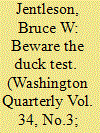

|
|
|
| 2 |
ID:
178655
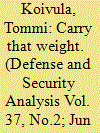

|
|
|
|
|
| Summary/Abstract |
This article proposes Stephen Jay Gould’s concepts of time’s arrow and time’s cycle as a conceptual tool to analyse NATO’s burden-sharing disputes. It argues that the controversies on burden-sharing in NATO can be assessed in terms of their cyclic or arrow kind nature, rendering some disputes more likely to recur than others and providing different kinds of starting points for their forecasting. The study identifies four cyclic categories in which burden-sharing has transformed into a political debate among NATO members during the post-Cold War era: geopolitical change related to Russia; periods of US foreign political retrenchment or renewal; the passivity or activism of European NATO members; and during NATO or allied out-of-area operations. Moreover, the study suggests an arrow kind of direction in burden-sharing disputes, indicating an expansion of disputes to cover comprehensive security, resilience, security co-operation and diplomacy, and to engulf also NATO partner countries.
|
|
|
|
|
|
|
|
|
|
|
|
|
|
|
|
| 3 |
ID:
086993
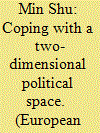

|
|
|
|
|
| Publication |
2009.
|
| Summary/Abstract |
European Union referendums invite national electorates to vote on transnational cooperation and regional integration, thereby creating tension between transnational ballot issues and domestic electoral mobilisation. Because of the tension, domestic political parties are forced to confront a two-dimensional political space in EU referendums. In the referendum-generated political space, unless integration issues are more salient than domestic concerns, intra-divided and inter-converged mainstream parties tend strategically to abstain from the campaigns. Yet, explicit inter-party collusion may allow the pro-integration mainstream to form a party cartel in EU referendums. Suggestive evidence is drawn from a case study of the two Irish referendums on the Nice Treaty. Based on a party-candidate survey, Irish parties are mapped onto a latent two-dimensional political space. The findings shed new light on the initial abstention of Irish mainstream parties in the first Nice campaign and their subsequent mobilisation in the second referendum.
|
|
|
|
|
|
|
|
|
|
|
|
|
|
|
|
| 4 |
ID:
133105
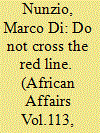

|
|
|
|
|
| Publication |
2014.
|
| Summary/Abstract |
Only five years after it lost a national election in Addis Ababa, the overwhelming victory of the Ethiopian People's Revolutionary Democratic Front (EPRDF) in the 2010 general elections marked the defeat of the opposition parties and the return to a dominant-party state. The capacity of the EPRDF to mobilize people in towns and the capital city triggered debates on the nature of consent in urban Ethiopia. This article contributes to this debate in two ways. First, it maps the specific institutions and strategies the ruling party has used to close political space in the capital since 2005, explaining how it has tied political mobilization to the delivery of services to those at the bottom of urban society. Second, it examines interactions between the ruling party and young people involved in government development programmes and youth organizations, demonstrating the subtle ways dissent is expressed even as EPRDF power is reproduced. In this regard, the victory of the ruling party in 2010 does not bear witness to the neutralization of dissent. Rather, it reveals a reshaping of the way the government has governed and controlled the city since the late 1990s.
|
|
|
|
|
|
|
|
|
|
|
|
|
|
|
|
| 5 |
ID:
148121
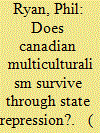

|
|
|
|
|
| Summary/Abstract |
Emma Ambrose and Cas Mudde argued in this journal that the absence of far-right parties in Canada can be attributed, among other factors, to “strong state repression of dissent” on multiculturalism policy. This article provides numerous examples of such dissent, to show that the state repression invoked by Ambrose and Mudde does not exist. The article also argues that certain “supply-side” explanations for the absence of a strong far-right apply to the Canadian case. It notes, in particular, how Steven Harper's Conservative government occupied much of the political space that might otherwise have been available for far-right challengers.
|
|
|
|
|
|
|
|
|
|
|
|
|
|
|
|
| 6 |
ID:
123643
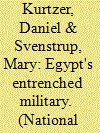

|
|
|
|
|
| Publication |
2012.
|
| Summary/Abstract |
FIFTY YEARS ago, drawn to the perceived dynamism of fresh, young military leaders, scholars and policy analysts became enamored of the potential role of the military in political, economic and social modernization. The "man on horseback," as S. E. Finer described it, was seen as best positioned to effect the transition from developing to modern societies. The military, it was believed, could draw on the institutional cohesion and its monopoly of coercive power to marshal the resources and will necessary to push societies forward. Egypt was studied as a prime example.
|
|
|
|
|
|
|
|
|
|
|
|
|
|
|
|
| 7 |
ID:
086753
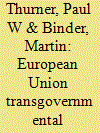

|
|
|
|
|
| Publication |
2009.
|
| Summary/Abstract |
Does the European Union (EU) represent a new political order replacing the old nation-states? The assessment of the real character of political orders requires the identification of political key actors and of the specific structure of their interactions. Transgovernmental networks have been considered to be one of the most important features of EU integration. Unfortunately, the network structures, processes and the impact of these informal horizontal inter-organisational relations between nation-states are mostly unknown. The main objective of this article is to measure and explain the selective pattern of informal bilateral relations of high officials of the EU Member States' ministerial bureaucracies on the occasion of an EU Intergovernmental Conference. The quantitative data used rely on standardised interviews with 140 top-level bureaucrats. The statistical estimation of network choices is based on recent developments of exponential random graph models.
|
|
|
|
|
|
|
|
|
|
|
|
|
|
|
|
| 8 |
ID:
153571
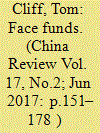

|
|
|
|
|
| Summary/Abstract |
In semi-industrialized rural China, villagers are getting together to
create their own micro welfare state. In response to inadequate state
support for the poor, disabled, and especially elderly of the village,
entrepreneurs form rotating credit associations and underground banks
that fi nance welfare schemes exclusively for those who hold a household
residency ( 戶口 hukou) in their village. Most of these schemes eschew
any formal engagement with the state, but where money, legitimacy,
and social stability are involved, the state is never far away. Th is paper
examines the development and propagation of these highly successful
nonstate welfare funds in parallel to the seminally unsuccessful state
eff orts at encouraging philanthropy, and reports on recent state eff orts
to co-opt and control this flourishing, indirectly contentious, civil
movement. Th e fairly gentle nature of state-society interactions to date
shrouds an implicit contest over political space at the grassroots level.
|
|
|
|
|
|
|
|
|
|
|
|
|
|
|
|
| 9 |
ID:
122168
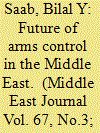

|
|
|
|
|
| Publication |
2013.
|
| Summary/Abstract |
Political space is opening up in the Arab world. While it is particularly difficult to speak with any degree of confidence on the ultimate trajectory of the Arab uprisings (with all their local variants), the process of democratization that is sweeping the region is likely to have a significant impact on how Arab societies and their soon-to-be representative governments make and conduct foreign and defense policy in the future. One key area of concern is the subject of regional arms control and disarmament.
|
|
|
|
|
|
|
|
|
|
|
|
|
|
|
|
| 10 |
ID:
129836
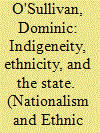

|
|
|
|
|
| Publication |
2014.
|
| Summary/Abstract |
This article draws on the politics of indigeneity to distinguish the claims of first occupancy from simple ethnic identity politics, illustrating that relative political marginalization in Australasia is not so much a function of minority status but of indigeneity itself. The politics of indigeneity's aim is to create political space for self-determination and a particular indigenous share in the sovereign authority of the nation-state itself. The Australasian states are compared with Fiji to demonstrate that the significance of historical constraints on political authority transcend the withdrawal of a colonial power and the restoration of collective indigenous majority population status.
|
|
|
|
|
|
|
|
|
|
|
|
|
|
|
|
| 11 |
ID:
108464
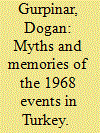

|
|
|
| 12 |
ID:
118554
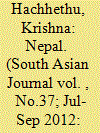

|
|
|
| 13 |
ID:
160669
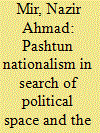

|
|
|
| 14 |
ID:
067820
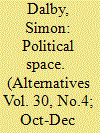

|
|
|
| 15 |
ID:
094447
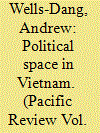

|
|
|
|
|
| Publication |
2010.
|
| Summary/Abstract |
Single-party, authoritarian states such as Vietnam are frequently characterised as having 'closed' political opportunity structures and 'un-free' socio-political systems. The validity of this observation depends, however, on the viewer's frame of reference. Seen from the perspective of active citizens, Vietnamese political structures offer increasingly greater space for collective action than a state-centred institutional analysis would predict. Episodes of contentious politics surrounding land disputes and public parks during 2007 provide evidence of the changing dynamics of participation in politics. Actors involved in these and similar campaigns are broadly optimistic about the future prospects for an opening of political space within the existing system. These findings are contrasted with international reports of violations of political rights and with the Vietnamese government's own efforts at legal reform. Although signals remain mixed, to some extent Vietnam might be becoming a 'rice-roots democracy' in practice, while remaining a single-party state. The voices and experiences of civil society actors will continue to shape opportunities and risks in the expansion of political space.
|
|
|
|
|
|
|
|
|
|
|
|
|
|
|
|
| 16 |
ID:
141643
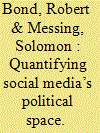

|
|
|
|
|
| Summary/Abstract |
We demonstrate that social media data represent a useful resource for testing models of legislative and individual-level political behavior and attitudes. First, we develop a model to estimate the ideology of politicians and their supporters using social media data on individual citizens’ endorsements of political figures. Our measure allows us to place politicians and more than 6 million citizens who are active in social media on the same metric. We validate the ideological estimates that result from the scaling process by showing they correlate highly with existing measures of ideology from Congress, and with individual-level self-reported political views. Finally, we use these measures to study the relationship between ideology and age, social relationships and ideology, and the relationship between friend ideology and turnout.
|
|
|
|
|
|
|
|
|
|
|
|
|
|
|
|
| 17 |
ID:
133549
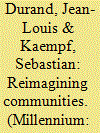

|
|
|
|
|
| Publication |
2014.
|
| Summary/Abstract |
There comes a time when transmitting the history of a national past fails the context of the political present. France and Germany have shared tortuous historical experiences, yet the two are at the forefront of an unprecedented pedagogical development: for the first time ever, two nation-states have created a common history textbook that is used in their senior secondary schools. As such, each country, to borrow Ernst Gellner's formula, has abandoned - qua this textbook - its monopoly of legitimate education. Histoire/Geschichte detaches history from its exclusive national past and introduces the learners to a post-national present. It speaks in a tone that is demanded by a different time and by the new conditions of peoples who are living in a common political space. This article reflects on the meaning and reach of this precedent by first analysing the explicit political and pedagogical explanations inherent to the book. It then identifies and investigates some of the less evident effects of the textbook relating to rethinking war and history, rethinking the monopoly of education, rethinking national identity, and to offering another path to rapprochement.
|
|
|
|
|
|
|
|
|
|
|
|
|
|
|
|
| 18 |
ID:
153416
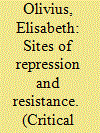

|
|
|
|
|
| Summary/Abstract |
Refugee camps are frequently perceived as spaces of emergency and exception. However, they are also spaces where millions of people live their everyday lives, sometimes for extended periods of time. As such, refugee camps are political spaces where struggles over the right to influence life in the camps and shape how they are governed are continuously ongoing. In this context, what are the opportunities for political participation for refugees living in camps? How and to what extent are refugees able to carve out political space where they can engage with and affect their lives and their situations? This paper addresses these questions through an analysis of refugee camps in Thailand. Drawing on Foucauldian analytics, the analysis demonstrates how key strategies employed to govern refugees, namely spatial confinement and development interventions are also creatively subverted by refugees and appropriated as bases for resistance and political mobilization. The article provides new insights into the relationship between power and resistance, demonstrating how specific technologies of governance create opportunities for subversion, reinterpretation, and appropriation.
|
|
|
|
|
|
|
|
|
|
|
|
|
|
|
|
| 19 |
ID:
087112
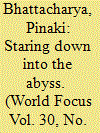

|
|
|
|
|
| Publication |
2009.
|
| Summary/Abstract |
Pakistan's army is facing its biggest test yet in tackling Islamist militancy and terrorism within its own national precincts. For an army that was not configured to counter large scale insurgency, having been trained instead to take on a single enemy, India, this is a test of mettle.
|
|
|
|
|
|
|
|
|
|
|
|
|
|
|
|
| 20 |
ID:
137248
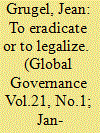

|
|
|
|
|
| Summary/Abstract |
International human rights agreements promote rights-based norms as a guide for policymaking. But the appropriateness and legitimacy of these norms is sometimes questioned in local contexts, where they can generate disagreement as to their meaning and implementation. Convention 182 of the International Labour Organization (ILO) led to a global commitment to eliminate the worst forms of child labor, but the agreement has been subject to intense criticism, especially in societies where child labor is prevalent such as Bolivia. This article sheds light on the complex impact of global rights-based norms in local contexts and reminds us that civil society is always a heterogeneous and political space of action. This article also traces the complex debate on eradication versus legalization of child labor within Bolivia.
|
|
|
|
|
|
|
|
|
|
|
|
|
|
|
|
|
|
|
|
|